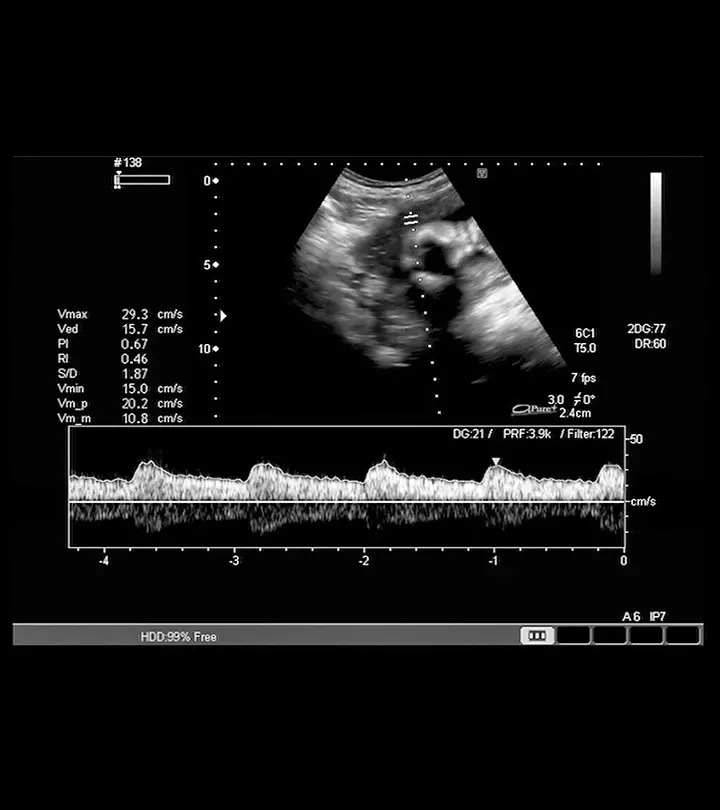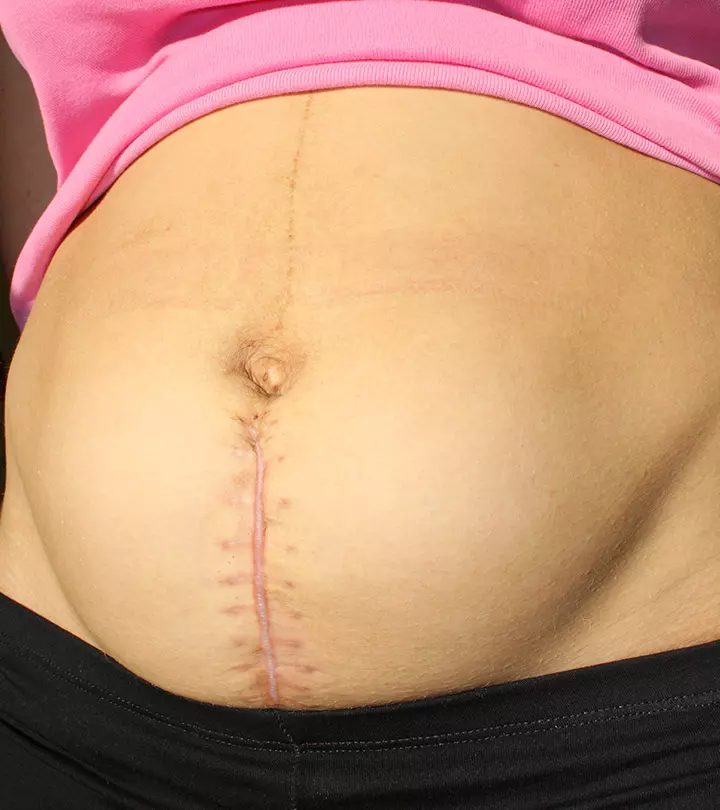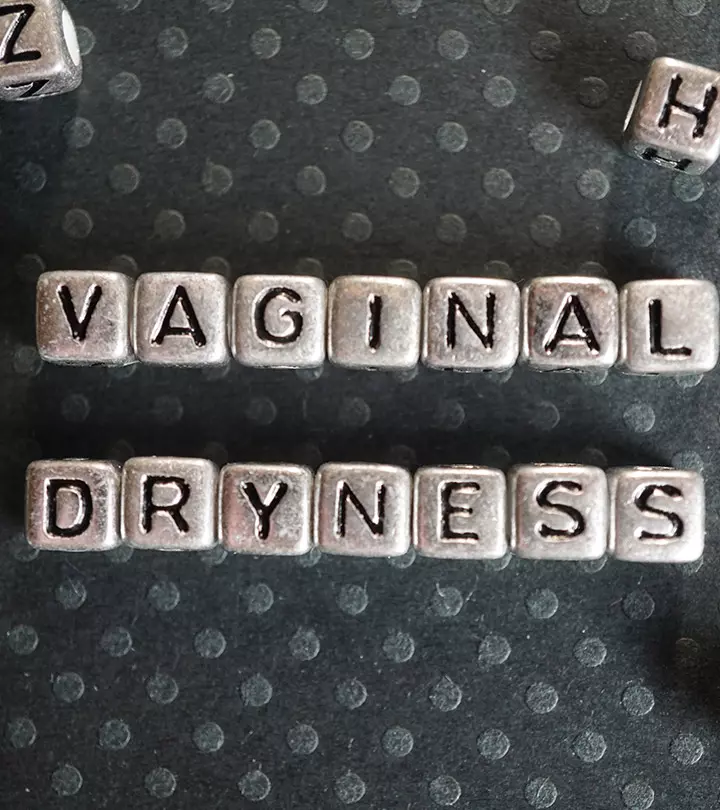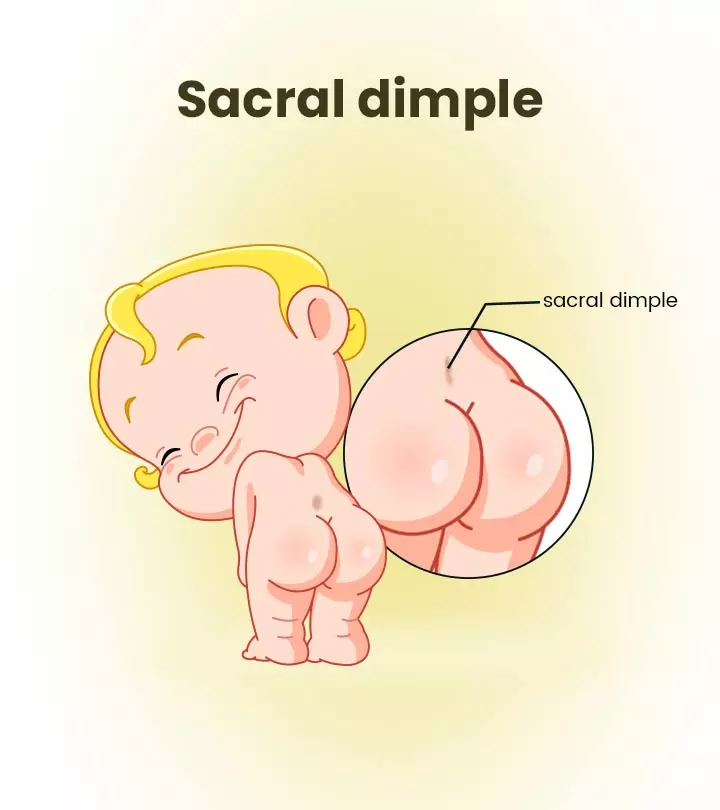
Image: ShutterStock
A fetal heartbeat can be detected on the first vaginal ultrasound of the fifth or sixth weeks of gestation.
Hearing your baby’s heartbeat can be exciting, and many parents want to listen to it over and over again. Doctors may let you hear it during the prenatal ultrasound. Monitoring fetal cardiac activity helps confirm a healthy pregnancy while creating an emotional connection. Sometimes, if done early, the fetal heartbeat may not be heard on the first ultrasound, and doctors can still assess the baby’s well-being and see their beating heart on the screen. So, an absence of fetal cardiac pulsations on initial ultrasound may not cause concern in most cases.
Read on to know more about the fetal heartbeat, what it indicates, and how to monitor it regularly during pregnancy.
Key Pointers
- A fetal heartbeat can be seen and heard during prenatal ultrasound by the sixth week of gestation.
- Sometimes, a heartbeat may not be heard in the early weeks due to inaccurate date calculations, the baby’s position, or the sonography method.
- No scientific evidence backs the claim that the heartbeat varies in boys and girls.
When Can You Hear The Baby’s Heartbeat For The First Time?
Your baby’s heart starts to beat as early as the 5th week (or 22 days) of pregnancy (1). This is when the first sign of a developing embryo called a fetal pole is visible.
If you are eager to listen to your baby’s heartbeat during pregnancy, it might be detected as early as six weeks in the case of an early pregnancy ultrasound scan (2). Or, you can listen to it during your first Doppler ultrasoundiAn imaging test that uses sound waves to record the blood flow through blood vessels. , which is a part of your first prenatal check-up, scheduled between the 12th and 14th week, or later in some cases (3).
Sometimes, the baby’s position in the womb may prevent you from hearing the heartbeat in either of the ultrasounds, but this should not be a cause of concern. You will have a follow-up ultrasound where you can listen to the embryonic heartbeat.
Sometimes, there could be other reasons preventing you from hearing the embryonic pulsation or fetal heartbeat. You can talk to the doctor about it.
Adelina Vasile, a mother of one, reminisces her experience of hearing her baby’s heartbeat for the first time and says, “That moment you hear your baby’s heartbeat for the first time. I swear I didn’t know what it was. I mean, if it weren’t the doctor telling her assistant — we have cardiac activity — I might have as well assumed that the transducer broke or something…I’ve heard people calling this moment magical. Heart melting. So real. Yep, “so real” is something I resonated with. But nothing else (i).”
Why You May Not Hear Fetal Heartbeat In An Early Ultrasound?
You may not be able to hear the heartbeat if the scan is too early in your pregnancy. In such a case, your doctor will reschedule another scan in one to two weeks. Some other reasons could be:
- The method your sonographer uses to listen to the heartbeat. Transvaginal ultrasoundiA scan in which an ultrasound probe is inserted into the vagina to examine the uterus, ovaries, tubes, cervix, and pelvic region. gets better results compared to transabdominal scaniA scan in which an ultrasound probe is pressed firmly against the skin of the abdomen to study the abdominal organs. or hand-held dopplers.

Image: IStock
- Inaccurate dates, when you are not sure about the last menstrual date or had irregular ovulation
- Highly active baby that keeps moving around the womb, blocking the view
- Fetal position in the womb
- Gestational age
If there are no issues, you will be able to hear it clearly. However, the heart rate of the baby is not usually steady and may change as the pregnancy progresses.
Normal Fetal Heart Rate Chart By Week
Fetal heart rate changes with the gestational age of the fetus. It starts at a slower rate that increases every day until it stabilizes around the 12th week. During a routine prenatal checkup, your obstetrician will assess the fetal cardiovascular activity. The doctor will check if the fetal heart rate is normal for its gestational age. For instance, the normal fetal heart rate at the 12th week of pregnancy is typically between 120 and 180 beats per minute (4). The fetal heart rate shows a gradual rise from 109 bpm at five weeks of pregnancy to reach its peak at the ten weeks of pregnancy, where it falls to a plateau.

Variations of Mean Fetal Heart Rate In The First Trimester
Source: The pattern of variations in the first trimester fetal heart rate in Indian populationThe below chart gives you an idea of how the fetal heart rate changes week by week (5).
| Fetal age | Normal FHR (bpm) |
|---|---|
| 5 weeks | 80 – 103 |
| 6 weeks | 103 – 126 |
| 7 weeks | 126 – 149 |
| 8 weeks | 149 – 172 |
| 9 weeks | 155 – 195 (average 175) |
| 12 weeks | 120 – 180 (average 150) |
| After 12 weeks | 120 – 160 (average 140) |
The audibility of heartbeat mostly depends on the fetal position and nature of abdominal tissues. Also, a normal embryonic heartbeat lowers the risk of miscarriage.
Baby’s Heartbeat At Birth

Image: IStock
The newborn’s (neonate) heart rate while awake is 100 to 165bpm and while sleeping is 90 to 160bpm. This is during the first 28 days of a baby’s life (6).
 Quick fact
Quick factDoes the Heart Rate Vary For Girls And Boys?
Baby’s heart rate has nothing to do with the baby’s gender. But, pregnancy myths conclude that the heart rate is over 140bpm if it is a girl and below 140bpm if it is a boy (7). However, this is purely an old wives’ tale, and the heartbeat cannot predict the gender of the baby.
Heartbeat Changes Throughout Pregnancy
Your baby’s heart continues to develop during pregnancy. The fetal heart rate is between 90 and 110bpm in early pregnancy (6). It will then rise and peak around the 9th and 10th week, to 170 bpm. Following this, the heartbeat becomes normal and stabilizes between 120 and 160bpm during the second and third trimesters.
If the heartbeat is too fast, too slow or irregular, there is a probability your baby is carrying some heart issue. However, these signs do not always indicate a heart problem and may warrant further testing via fetal echocardiogramiAn imaging test that uses sound waves (ultrasound) to evaluate the heart of a developing baby. .
In case of an abnormality, your doctor may ask you to change your position during the procedure so that the baby gets enough oxygen. If it does not resolve the condition, and the problem persists, they may order other tests for making the right diagnosis.
Does A Baby’s Heart Rate Fluctuate During Pregnancy?
Fetal heart rate is not always consistent early in pregnancy and varies from pregnancy to pregnancy and baby to baby. Following are the factors that might affect the pulse rate:
- Blood sugar levels: Higher blood sugar levels correlate to a higher fetal heart rate, whereas lower levels contribute to a lower heart rate (8).
- Fetal activity: Heart rates also fluctuate due to fetal activity or stress. An active baby has a higher heart rate whereas a sleeping baby has a lower heart rate. Studies also state that variability in the fetal heart rate helps in determining fetal health (9).
- Mother’s diet: Certain foods and beverages such as chocolate, sugar, and coffee stimulate the heartbeat of the baby. Consuming any of these before an ultrasound could cause a temporary rise in the fetal heart rate (10).

Image: IStock
Drawing conclusions about the health of a baby based solely on prenatal heart rate is not a reliable approach. There may be situations in which it is not measured incorrectly. Only follow-up tests could help in determining the baby’s health condition.
How To Keep The Baby’s Heart Healthy?

Image: Shutterstock
Besides the factors mentioned above, genetic or chromosomal abnormalities also cause the baby’s heartbeat to fluctuate. Here are a few ways to keep the baby’s heart healthy and the heart rate ideal.
- Take folic acid supplements as they help in lowering the probability of congenital heart defects in the baby.
- Quit smoking as early pregnancy smoking is known to cause 2% of heart defects, including anomalies of valves and vessels, in babies.
- Manage your gestational diabetes by taking the right medications and steps to control the blood sugar levels.
- Do not take alcohol or drugs.
- Avoid using AccutaneiA potent vitamin A derivative medication used to treat severe acne for acne when you are pregnant, as it can cause fetal heart issues.
While you do this, you may also want to check or monitor your baby’s pulse rate at home, using a heart rate monitor.
Is It Safe To Monitor The Baby’s Heart Rate At Home?
Home fetal heart rate monitors work by using very low emission ultrasound technology, and should be used only after your doctor’s approval. Also, frequent use of ultrasound can lead to tissue heating and formation of small bubbles (cavitation) in some tissues. The long-term effects of tissue heating and cavitation on the mother or the child are unknown (11).
Use of fetal rate monitors at home is recommended only after 10 to 12 weeks of pregnancy. The results you get should not be considered final or not override the results of the scan by the medical professional (12).
 Did You Know?
Did You Know?Methods Used To Monitor Fetal Heartbeat
Health care providers use two methods to monitor the heartbeat of the fetus. They are mostly used in late pregnancy or labor (13).
- External fetal heart monitoring: This procedure uses a hand-held device called Doppler ultrasound that involves listening to the heartbeat through your abdomen. It is mostly used during prenatal check-ups to find if the fetus is growing healthily.
- Internal fetal heart monitoring: This uses an electronic transducer that is fixed on the fetus’ scalp through the cervical opening. A wire that passes through the cervix helps measure the fetal heart rate. It is used at the time of labor so that the FHR and uterine contractions can be monitored simultaneously.
Ultrasound And Congenital Heart Defects
Your first prenatal ultrasound, which is scheduled sometime between the 6th and 9th week, confirms your pregnancy, determines the due date and monitors the embryonic heartbeat. Considering that nearly 1% of births every year are known to have congenitaliAn inherited or acquired condition that exists at birth heart defects, the doctor observes the structure of the heart to check for any congenital disabilities in the second ultrasound, or the 20th-week anatomy scaniAn ultrasound scan performed between 18 and 21 weeks of pregnancy to assess the fetal development (14) (15).
Though there is no treatment in utero, it helps the doctors decide when and how to deliver the baby. Most congenital issues are corrected after the baby’s birth, either through surgery or medications. If there is a problem with the prenatal cardiac rhythm, your doctor may suggest medications to decrease the risk of complications in the baby.
 Quick fact
Quick factFrequently Asked Questions
1. How to tell the difference between a fetal heartbeat and mine?
The fetal heartbeat is two times faster than a healthy adult and is 120 to 160 beats per minute (16).
2. Can fetal heartbeat monitoring hurt the baby?
The external fetal heart monitoring using a transducer generally does not harm the baby. However, there is a slight risk of infection or bruising to the baby’s scalp and body parts during the internal monitoring (17).
3. When is the heart fully formed in a fetus?
The baby’s heart starts developing right from conception and completes its formation by eight weeks of pregnancy (18).
The fetal heartbeat can usually be heard by the first week of the second trimester. But if you are unable to hear it due to the baby’s position, it is not a cause for concern. The baby’s heart rate fluctuates throughout the pregnancy due to several reasons and usually comes to a stable rate around the third trimester. It is advised that you regularly take folic acid supplements, avoid any substance abuse and follow a healthy lifestyle to lower the risks of congenital heart diseases in your developing baby.
Infographic: Facts About Fetal Heart Rate Monitoring
Fetal heart rate monitoring is accurate and reliable in assessing fetal wellbeing. It could alert the healthcare provider of potential problems in the fetus. However, fetal heart rate monitoring cannot predict all future health issues in infants. See the infographic to learn some interesting facts about fetal heart monitoring. Illustration: Momjunction Design Team
Illustration: When Can You Hear Fetal Heartbeat: A Week-by-Week Chart

Image: Dall·E/MomJunction Design Team
Uncover the secrets of monitoring your baby’s heart rate through an informative video! Gain invaluable tips on listening and tracking your little one’s precious heartbeat.
Personal Experience: Source
MomJunction articles include first-hand experiences to provide you with better insights through real-life narratives. Here are the sources of personal accounts referenced in this article.
i. First time I heard baby’s heartbeat;https://medium.com/the-memoirist/the-first-time-i-heard-love-and-it-sounded-nothing-like-it-c6e2125ae47c
References
1. Sailesh Kumar; Fetal and placental physiology; ScienceDirect (2010)
2. Early Pregnancy Scan (6 -14 weeks); Midlands Ultrasound & Medical Services (2015)
3. Jeffrey Frank Jones; Manuals Combined: U.S. Army Special Forces And Navy Operational Obstetrics & Gynecology With Physical Exam Techniques; Page 88
4. Stephanie Pildner von Steinburg et al.; What is the “normal” fetal heart rate; PeerJ (2013)
5. Peter M. Doubilet et al.; Embryonic Heart Rate in the Early First Trimester: What Rate is Normal; Wiley Online Library
6. Heart Rates in Kids with Complex Medical Conditions; Complex Child Magazine
7. L. A. Bracero et al.; First trimester fetal heart rate as a predictor of newborn sex; J Matern Fetal Neonatal Med (2017)
8. Glucose Levels in Pregnant Women Affect Fetal Heart Rate; DiabetesInControl (2015)
9. Janusz Jezewski et al.; A novel technique for fetal heart rate estimation from Doppler ultrasound signal; Biomed Eng Online (2011)
10. Buscicchio G et al.; The effects of maternal caffeine and chocolate intake on fetal heart rate; J Matern Fetal Neonatal Med (2012)
11. Avoid Fetal “Keepsake” Images, Heartbeat Monitors; Topsfield Massachusetts Government
12. Judith Rogers; The Disabled Woman’s Guide to Pregnancy and Birth; Page 252
13. Nancy A. Bowers et al.; External and Internal Heart Rate Monitoring of the Fetus; University of Rochester Medical Center
14. Congenital Heart Defects (CHDs); Centers for Disease Control and Prevention (2024)
15. Finding Out About a Heart Problem Before Your Baby is Born?; Congenital Heart Network
16. Check the baby; Hesperian Health Guides
17. Fetal Heart Monitoring; Stanford Children’s Health
18. Congenital Heart disease; Stanford Children’s Health
19. Fetal Heart Monitoring; Johns Hopkins Medicine
Community Experiences
Join the conversation and become a part of our nurturing community! Share your stories, experiences, and insights to connect with fellow parents.
Read full bio of Dr. Neha Singh
Read full bio of Rebecca Malachi
Read full bio of Dr. Ritika Shah
Read full bio of Reshmi Das
















